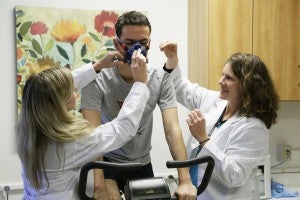Webdog
Senior Member (Voting Rights)
I verified with Stanford that it was ok to share with other patients. This Montoya study is on exercise, the human microbiome and ME/CFS, and includes a bicycle exercise tolerance test.
----
Over the past year, there has been growing interest in Myalgic Encephalomyelitis/Chronic Fatigue Syndrome (ME/CFS) around the world. An increasing number of scientists and clinicians are engaging in research and practices that have the potential to lead to a greater understanding of the root causes of ME/CFS. I am excited to report that Dr. Jose Montoya’s Stanford ME/CFS Initiative will be joining in a new collaborative research effort with Columbia University to further understand the association between exercise, the human microbiome and ME/CFS.
We are inviting you to participate in a new study entitled “Exercise and Immune Profiling in ME/CFS”. In this study, we will ask you to participate in a baseline screening assessment in our clinic (Location: Stanford University). We will ask you to provide in-depth information about your symptoms and medical conditions in the form of questionnaires, and to undergo a brief physical exam and blood collection; At this time, our team will provide kits for the collection of stool and saliva samples for the next phase of the study, and we will schedule your appointment for a bicycle exercise tolerance test (ETT).
In the next phase, you will be asked to complete two study visits, immediately before and 24-hours after administration of an ETT (Location: Stanford Hospital). You will bring your collected samples (stool and saliva for research purposes) with you, and will undergo blood collections at both visits. You will complete a series of questionnaires at each visit, and at three time points in between.
All procedures conducted under this research study will be free of charge.
Upon completion of each study assessment, sample collection and self-report questionnaires, you will receive reimbursement in a staged fashion. Therefore, you will receive $25 for the pre-ETT visit 2, $50 for the ETT visit and $50 for the post-ETT visit.
If you are interested in participating in this study, please complete the following eligibility survey (Prescreening for ME/CFS Exercise Tolerance Testing Study). If you are not interested in the study or do not wish to participate, please do not be concerned. Your decision will in no way affect the clinical care that you receive at Stanford Hospital & Clinics. If you would like to get in touch with the Clinical Research Coordinator, Tullia Lieb, please email tlieb@stanford.edu
Participant’s rights questions, contact 1-866-680-2906
Sincerely,
Jose Montoya, M.D.
----
Over the past year, there has been growing interest in Myalgic Encephalomyelitis/Chronic Fatigue Syndrome (ME/CFS) around the world. An increasing number of scientists and clinicians are engaging in research and practices that have the potential to lead to a greater understanding of the root causes of ME/CFS. I am excited to report that Dr. Jose Montoya’s Stanford ME/CFS Initiative will be joining in a new collaborative research effort with Columbia University to further understand the association between exercise, the human microbiome and ME/CFS.
We are inviting you to participate in a new study entitled “Exercise and Immune Profiling in ME/CFS”. In this study, we will ask you to participate in a baseline screening assessment in our clinic (Location: Stanford University). We will ask you to provide in-depth information about your symptoms and medical conditions in the form of questionnaires, and to undergo a brief physical exam and blood collection; At this time, our team will provide kits for the collection of stool and saliva samples for the next phase of the study, and we will schedule your appointment for a bicycle exercise tolerance test (ETT).
In the next phase, you will be asked to complete two study visits, immediately before and 24-hours after administration of an ETT (Location: Stanford Hospital). You will bring your collected samples (stool and saliva for research purposes) with you, and will undergo blood collections at both visits. You will complete a series of questionnaires at each visit, and at three time points in between.
All procedures conducted under this research study will be free of charge.
Upon completion of each study assessment, sample collection and self-report questionnaires, you will receive reimbursement in a staged fashion. Therefore, you will receive $25 for the pre-ETT visit 2, $50 for the ETT visit and $50 for the post-ETT visit.
If you are interested in participating in this study, please complete the following eligibility survey (Prescreening for ME/CFS Exercise Tolerance Testing Study). If you are not interested in the study or do not wish to participate, please do not be concerned. Your decision will in no way affect the clinical care that you receive at Stanford Hospital & Clinics. If you would like to get in touch with the Clinical Research Coordinator, Tullia Lieb, please email tlieb@stanford.edu
Participant’s rights questions, contact 1-866-680-2906
Sincerely,
Jose Montoya, M.D.

